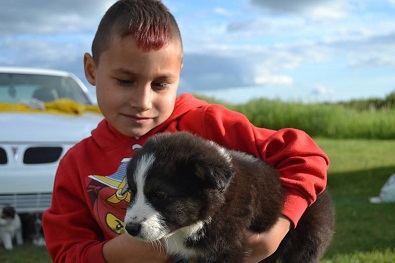Photo courtesy Canine Action Project, Facebook.
A call for help from Sturgeon Lake Cree Nation has saved the lives of more than 150 dogs and cats.
The Prince Albert-area reserve approached the Canine Action Project (CAP) to avoid a cull in the community.
At the end of October, volunteers with CAP and Sturgeon Lake undertook the massive effort of canvassing homes to discover how many pets and strays needed to be re-homed. Over the course of four days, 144 dogs and 19 cats were taken from the communities to different animal rescues throughout Western Canada.
CAP’s founder Kelly Phips emphasized that CAP is not a rescue, but the situation in Sturgeon Lake was viewed as an emergency by members and the community itself.
For years, Sturgeon Lake has struggled with its stray population. Often, dogs form into packs. This leads to health issues and safety concerns for families in the community.
Over the past two years there have been about 15 dog bites – 10 to the neck and above – and almost half have been to kids, said Bailey Nikolaisen, a nursing student on her community health nursing program.
When she first started working in the Sturgeon Lake, Nikolaisen was alarmed to see the dog packs – some who have even bred with wild coyotes – and the health issues they cause in humans. This includes rabies, and children she had to treat from worms, which she says is likely contracted when kids played in areas that an infected dog had defecated.
As an animal lover, Nikolaisen started taking in dogs and connecting with animal rescues to find them homes, but before long realized she couldn’t help the many strays in Sturgeon Lake by herself.
Recently Jeff McLeod, animal control officer and man-of-many-hats in Sturgeon Lake, alerted Nikolaisen that for a number of years, in the fall, Sturgeon Lake has had a cull to deal with its out-of-hand population.
“They were starting to be in heat now, the dogs, and they were having puppies. And it’s going to be cold soon and the puppies are going to freeze, and the dogs are just going to get pregnant again. This is a cycle, let’s put a stop somewhere,” Nikolaisen said.
So, Nikolaisen helped Sturgeon Lake team up with CAP to find an alternative way.
It’s a huge undertaking that started just before Halloween and took four 16-hour days just to gather all the dogs, but animal control officer Jeff McLeod said the effect has been immediate.
“It was the first time in a long time, this past Halloween, that a lot of kids were able to go from house to house without being chased by dogs or their parents weren’t carrying sticks or like, logs to protect their kids or protect themselves,” he said.
This is the biggest project the Canine Action team has ever worked on, and a second sweep to find any other animals that can’t be cared for will take place on Wednesday.
Monique Schultz, who has been with CAP since its inception about five years ago, said hearing that story from McLeod made those long days worth it.
Phipps says there are a lot of misconceptions about pets on First Nations. She’s visited over 1,000 First Nations homes over the years.
“People are so thankful for us to go and help them and their dogs. The majority of the time, they love their dogs, they want to care for their dogs. The just don’t have the means, the tools and the resources to do so,” Phipps said.
The fact that culls happen, doesn’t mean families in places like Sturgeon Lake don’t love their pets.
“Yes there are dogs that are underweight, there are dogs that are hurt, and injured,” Phipps said. “But quite often people may not have a vehicle to be able to take an animal to the vet, they may not have the money to do that as well.”
CAP has a goal of empowering remote and First Nations communities to control their animal populations and keep them safe. To do this, they build relationships, facilitate spay and neuter clinics in those communities, meet with elders, hold information sessions, and vaccinate, de-worm and tattoo pets.
Phipps emphasizes programs like CAP to provide more than a Band-Aid solution, and to help communities break free from seeing culls as the only option.
